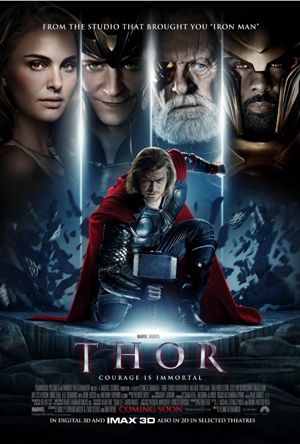 You can check out Part 1 of the press conference with the cast here. The second session was with the filmmakers: director Kenneth Branagh, Marvel honcho Kevin Feige, and writers Zack Stentz, Ashley Miller and Don Payne. Unfortunately, I didn’t get a question in this go-round. If I had, however, I would have remarked that I appreciated the fact that the tired scenario of Thor being a fish-out-of-water and an alien adjusting to life as a mortal, getting a job, that whole sort of thing was kept to a minimum in the script. And I was planning to ask MINOR POILER, Invisotext on: if there was ever a consideration to have Thor turned into Dr. Don Blake when he was cast out of Asgard by Odin, and thus necessitating a different actor to portray that role. Which they chose not to do, and definitely was the way to go, because Chris Hemsworth owned in this movie. Invisotext off.
You can check out Part 1 of the press conference with the cast here. The second session was with the filmmakers: director Kenneth Branagh, Marvel honcho Kevin Feige, and writers Zack Stentz, Ashley Miller and Don Payne. Unfortunately, I didn’t get a question in this go-round. If I had, however, I would have remarked that I appreciated the fact that the tired scenario of Thor being a fish-out-of-water and an alien adjusting to life as a mortal, getting a job, that whole sort of thing was kept to a minimum in the script. And I was planning to ask MINOR POILER, Invisotext on: if there was ever a consideration to have Thor turned into Dr. Don Blake when he was cast out of Asgard by Odin, and thus necessitating a different actor to portray that role. Which they chose not to do, and definitely was the way to go, because Chris Hemsworth owned in this movie. Invisotext off.
[BEGIN AUDIO]
INTERVIEWER: Kevin Feige?
KEVIN FEIGE: Hello.
INTERVIEWER: Kenneth Branagh?
KENNETH BRANAGH: Yes, hi [INDISCERNIBLE].
INTERVIEWER: [OVERLAPPING] Zack Stentz and Ashley Miller.
UNIDENTIFIED SPEAKER: Yeah, it’s the red and blue, what’s–
KENNETH BRANAGH: Good morning.
CROWD: Good morning, morning.
KENNETH BRANAGH: Hi.
INTERVIEWER: And if it’s all right, can everybody introduce themselves on the mic, so the recorders pick up, please?
We’ll start with you.
ASHLEY MILLER: Hi, I’m Ashley Miller.
UNIDENTIFIED SPEAKER: [INDISCERNIBLE]
ZACK STENTZ: I’m Zack Stentz.
KENNETH BRANAGH: I’m–I’m Ken Branagh.
KEVIN FEIGE: Kevin Feige.
DON PAYNE Don Payne.
INTERVIEWER: Okay, and the first question.
INTERVIEWER: Mr. Branagh, when the news was announced that you were directing the film there was some discussion that you felt like perhaps a less likely choice. I’m wondering if during filming you ever felt like a less likely choice to direct [SOUNDS LIKE] your film.
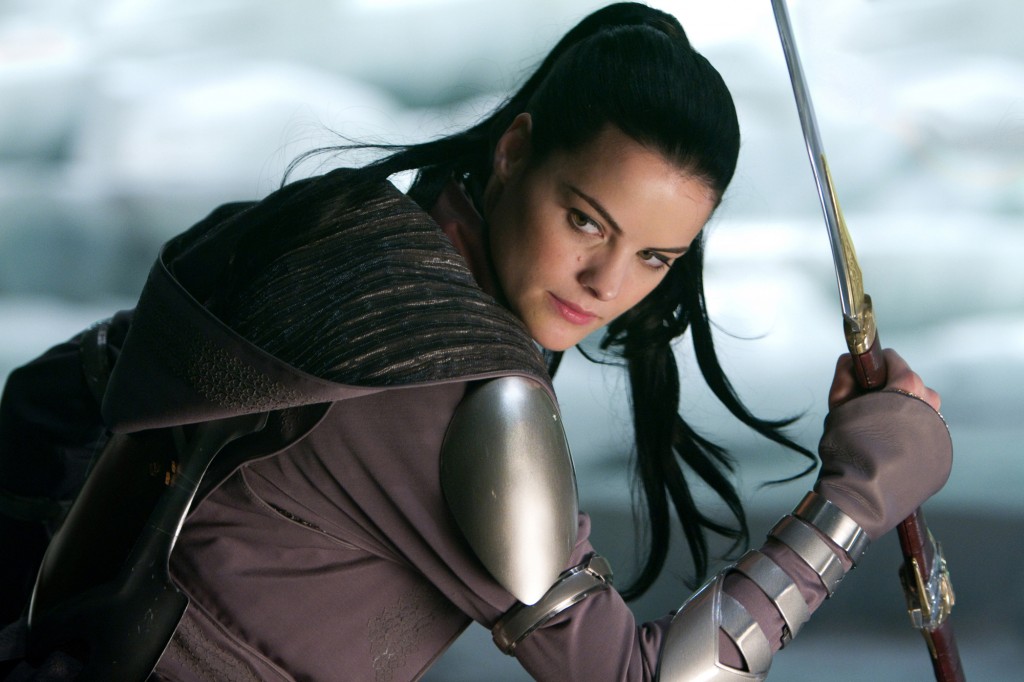
KENNETH BRANAGH: [LAUGHS] The scale of the undertaking couldn’t help but make you feel occasionally that–you know, it was–it was very, very challenging, but that was part of what was attractive. And people sometimes ask me, “Well how did you–how did you do it?” And I say, “Have you seen the credits at the end, there’s seven minutes of ‘em. You see all of those names?
That’s how I did it.” This is how I did it, I’m surrounded–four lads here who were, you know, crucial to it. And frankly when you walked on Day One and there are frost giants and there’s green screen and there’s real mist and rain and there are six principals in their new costumes for the first time and all of that and four camera crews and hundreds of people, frankly these are the kinds of people you go and squeeze and say, “What do I do next?” [LAUGHTER]
In fact, I’ll tell you this is what Kevin, Day One–I think Day One and I feel in your office in Beverly Hills I said, “So what should I do first, you know, the first day at school. Should I go to visual effects? Should I go to Three-D, all the places I don’t know? And actually you said–I don’t know if you remember this but you said, “The one thing you need to do right now and until it’s finished is cast Thor. That’s it, just cast Thor.” And that–the–every time I watch the movie and I see Tad Asano later in the movie responding to a bit of the story and he goes, [WHISPERS] We must find Thor! We must find Thor!” And I remember that was Day One, “Find Thor!” [LAUGHTER] So we did.
INTERVIEWER: Hi Kenneth, what inspired you to cast Tadanobu Asano while you can, you know, cast a Asian-American or a British-American–I mean, an Asian British actor instead?
KENNETH BRANAGH: Well, you might like to talk about that to Kevin, but I had just seen the–you know, about the history of the character in the comics. I saw Tad in Mongol and I just thought, “Amazing actor.”
KEVIN FEIGE: That’s all it was; we were a fan of his work. And he’d recently, I think got a U.S. agent and was interested in doing U.S. films and we were excited to have him.
INTERVIEWER: This is now the fourth film in the Marvel cannon line I suppose, but for this film did you feel limited in any way or because it was the first story for this character was that–did that–did you feel free?
KENNETH BRANAGH: Me?
INTERVIEWER: [SOUNDS LIKE] Oh, yeah.
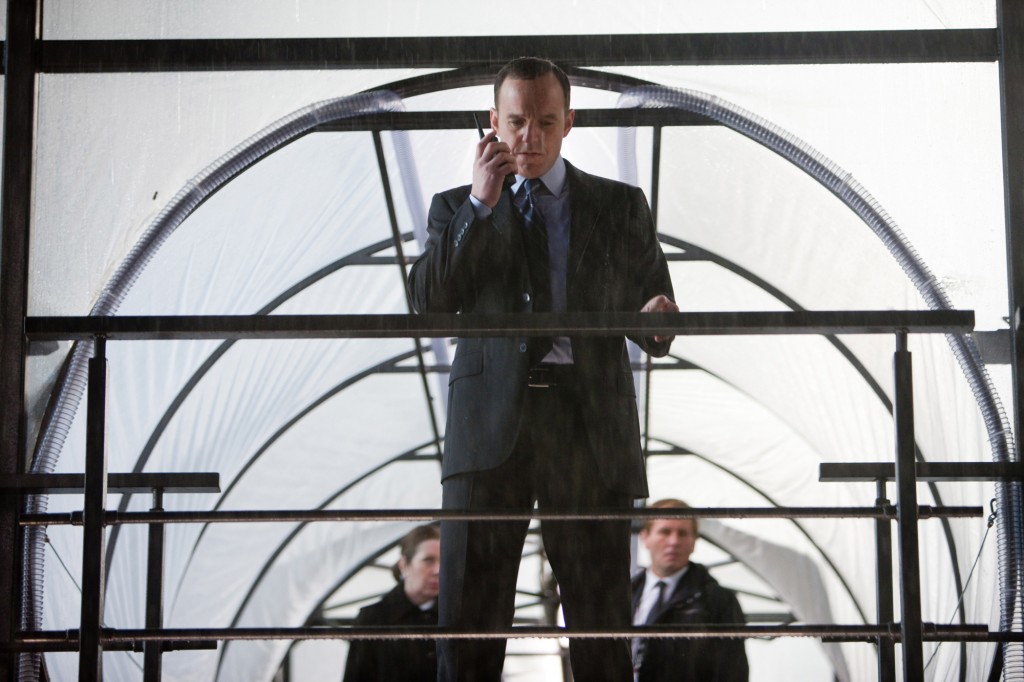
KENNETH BRANAGH: The–absolutely, because also the–Kevin and the rest of my colleagues at Marvel were sort of completely–and to me invisibly–being the architects of the larger universe. And I always felt whether it was simply because that’s all I was capable of, and I feel as though that’s true, that Thor and Thor for one film is all–this is all I have to do is try. And boy, that’s enough, is how do you introduce this character? And then the process by which, you know, it may affect other things. For my money, and I’m not just saying it because he’s sitting here, but it was [STUMBLES] smooth, and it was–also as a viewer I am intrigued by the interweaving of the way things happen in the Marvel universe. And so I was so excited by the opportunities to maybe some–relate to that in some way with there. But it’s actually, you know, it’s a collaboration partnership. We talk, you do it, the [PH] freedom-smeedom at all really doesn’t come into it, you’re just making a film.
INTERVIEWER: Kenneth, do you think that your experience in other effects movies like Potter for example, as an actor did that give you more–make you a little bit more comfortable in terms of now that you’re making this big effects laden film yourself as a director?
KENNETH BRANAGH: Yes, although, you know, my experience was that the sort of–the quality of the technology changes. The advances in the technology change so much that it’s really always on a daily basis is advancing. So I did the Harry Potter quite some time ago and as brilliant as they are I think Marvel, you know, are on the sort of cutting edge of things, so I’m pleased to say so. The whole of the process from Day One through to the end was an expanding possibility with visual effects. So it was a bit of preparation, but frankly it was new opportunities every day.
INTERVIEWER: Hi, question to Kenneth, you know, how challenging for you to direct the movie based on the comics compared with the Shakespeare film? You know, which one is harder?
KENNETH BRANAGH: Ah, it’s the scale thing, you know, that is tricky. But I mean, why don’t you speak a little to–just because, you know, I’m inside out. Just the–what the Marvel sort of–and your position on how difficult it was to go from comics to the screen with this particular character, maybe?
KEVIN FEIGE: Well, all the characters have their own challenges of course; Thor, being a particular challenge because he’s from another world. We haven’t done a–we don’t have a Superman type character who is from other worlds. You know, in our cosmic-side of the universe we do, but in terms of the primary characters that we have Thor is unique in that regard. He also is unique in that he is based in part on Norse mythology, so you have, you know, sort of a big melting pot of a lot of different ideas, which 45 plus years ago Stan Lee and Jack Kirby put together into our great sort of mythology. And now we’re 600 plus issues into it now and we sat with 600 issues and said, “What story do we tell?” And frankly the writers had a big challenge and we’ve been working on the movie for many years and there were a lot of different incarnations. So I won’t–sort of trial and error, but figuring out we’re gonna introduce the story that starts on Earth, present day, take the viewer to–and just basically throw ‘em into these other worlds–and then bring them back to Earth. So we have a little bit of an idea of where Thor is from and why he’s reacting the way he is was probably structurally the biggest challenge.
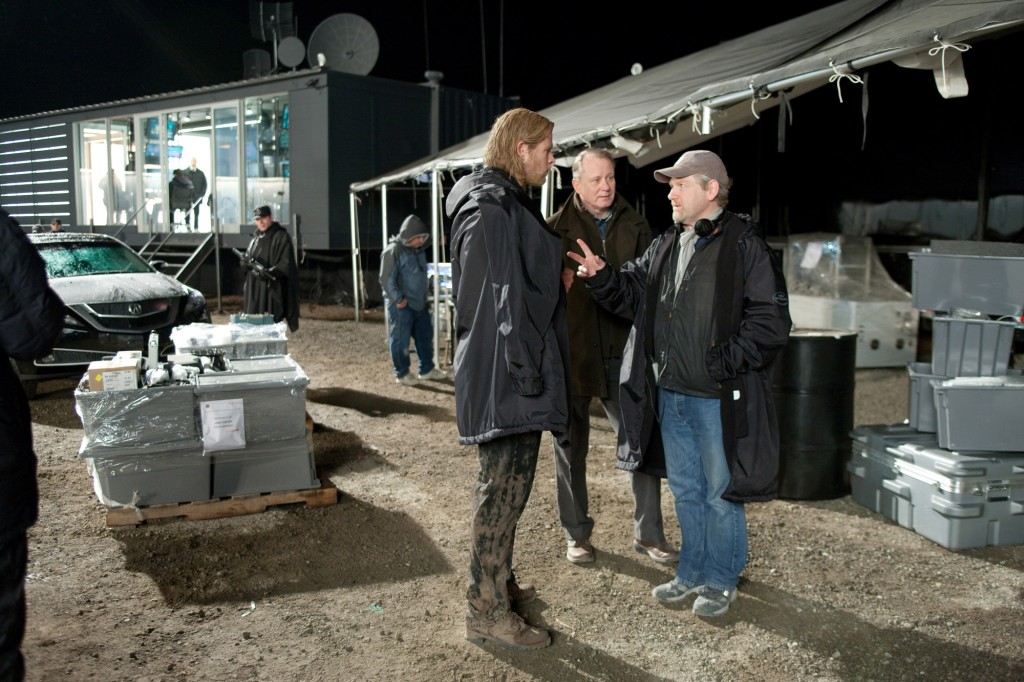
INTERVIEWER: And for Kenneth did you find this–it’s very Shakespearian in a way, this family. Did all of your work with Shakespeare help you with that, and also wondered is there an origin story where he finds the mallet and he becomes Thor for the first time? And I wonder why you–‘cause I don’t know the comic books–why you didn’t maybe choose to do that?
KENNETH BRANAGH: Well, to answer the first one the–you know, we’d just seen about two billion people watch a royal family at work, you know? And so I would say that it is Shakespearian, but just–it’s global I suppose. That we’re interested in what goes on in the corridors of power whether it’s the White House or whether it’s Buckingham Palace or… And so Shakespeare was interested in the lives of, you know, the medieval royal families, but he also raided the Roman myths and the Greek myths for the same purpose. And I think Stan Lee went to the myths that Shakespeare hadn’t used. You know, all of them recognizing that they contain briefly told, very condensed stories of–that I think are very universal in their application. I think the connection, if there is one, is that the stakes are high. So in something like Henry the IVth or Henry the Vth where the young prince–how a reckless man falling into bad company, could that prince be the king? Is he the right man for the job, is that kind of story. Our flawed hero who must earn the right to be king, is in our piece, but I think what’s key is the stakes. There it’s Europe and England in power and here it’s the universe. It’s when that family has problems everybody else is affected, so it is–it’s like, you know, if Thor throws a fit and is yelling at his father and is banished, I mean suddenly it’s–the world is–the worlds are unstable. And what it means is if the actors take those stakes seriously it is passionate and it is, you know, very intense. And I suppose that kind of a observation of ordinary human–although they’re gods–frailties’ in people in positions of power is an obsession of great story tellers including Shakespeare and including the Marvel universe.
INTERVIEWER: For the writers, it seems like there are few adaptations more daunting than five decades of material as well as mythology that’s thousands of years old. Where do you begin to pull the story together?
ASHLEY MILLER: Terror. [LAUGHTER] No, honestly the first place you start is with Kevin and with Ken and getting a sense of the story that they want to tell. And if the story that they want to tell is about the god king who is cast down to earth and has to learn humility before he can return home, that’s the story. You figure out what that structure is and more importantly you figure out who the human being is. It helps, you know, speaking for myself and Zack and I’m sure Don it–huge comic book fans–you have that informing the things that you do and the things that you say and you write about. But it’s the first rule that you apply to any other writing effort, you find the person in the middle of the story, you figure out what their story is and you tell it. In this case it was Thor and it was also Loki and Odin in between them and the rest comes out of that inherent conflict.
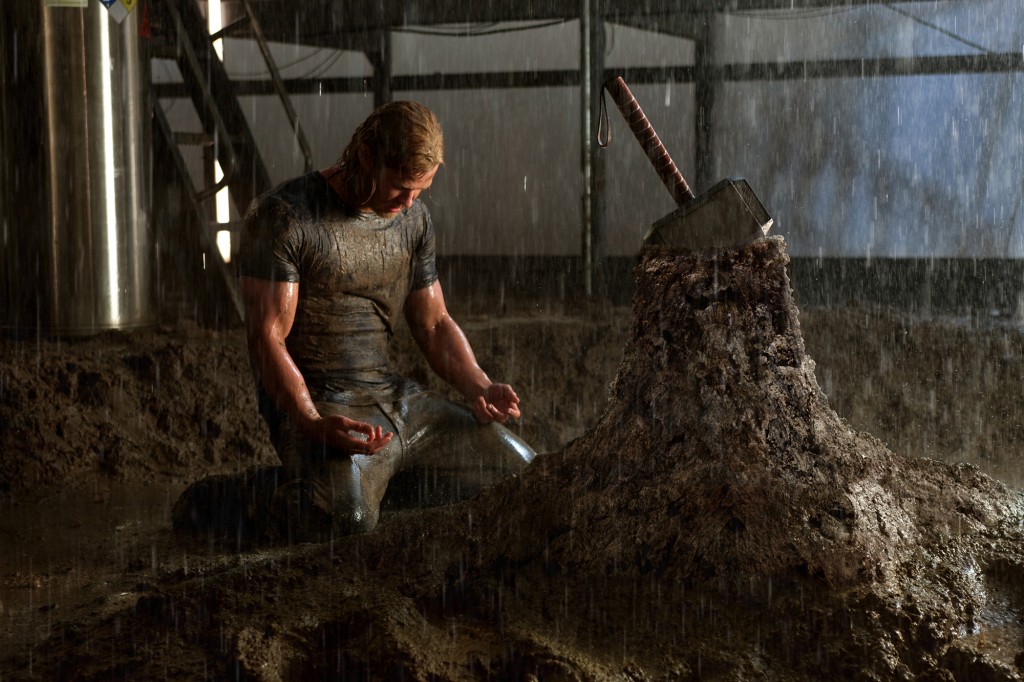
UNIDENTIFED SPEAKER: I do want to mention the other writers who aren’t here today too, who have story credit: Mark Protosevich and J. Michael Straczynski who helped craft the story early on. That’s why they have story credit but, you know, we built on a foundation of all those years of comics and we were able to select the best moments and that’s thanks to Stan Lee and Larry Lieber and Jack Kirby and Walt Simonson and [PH] JMS once again. And so I think we all have our favorite moments and I think we build from that.
UNIDENTIFIED SPEAKER: And [PH] Snory Sterlson.
UNIDENTIFED SPEAKER: Snev–Snory, can’t forget Snory.
UNIDENTIFED SPEAKER: That’s true.
ASHELY MILLER: That’s true, he did a one shot.
UNIDENTIFED SPEAKER: That’s true, it’s a called the prose edda.
UNIDENTIFED SPEAKER: Yeah.
INTERVIEWER: You spoke earlier about the magnitude of casting your Thor. Can you walk us through the casting process a little bit more and then once you were on set what Anthony and Chris’s relationship was like?
KENNETH BRANAGH: I think the–well, from what the boys were saying, you know, finding the–finding that sort of character arc for Thor was key and we were doing that all the way through the early process of finding Thor. So it’s true to say that Chris Hemsworth came in early on and I think that we weren’t fully on the page with what we were developing for him. We weren’t as–we weren’t as clear–we became pretty ambitious with what was clearly going to be a character journey. Somebody who definitely changed from the beginning of the movie to the end, so we–the more we’d realize that the more we realized it wouldn’t only rely on brawn it would need some sort of acting brains and some emotion and some fun and that the character could take it and the story seemed to want it. And so we’re looking for–yeah, really a lot tied up in bundle.
And then at some point we said, “Well, we should go back and meet that very handsome Australian lad who came in when our story wasn’t really on the page. And when he came back and he did a number of things, he read and he did sort of workshops and he read with actors, with actresses. And then on one day when he kind of nailed it he told a story of Thor’s kind of deeds like a warrior retelling some story of a great battle and the mixture of a kind of arrogance that he needed to have still was done with such charm that it was–that it seemed to be that, you know, that absolutely–that nailed it. It meant that when he got on set with Tony Hopkins there was the–additionally this required quality of an innate charming confidence that did not spill over into arrogance or overconfidence that meant that he would stand up in a scene with Tony Hopkins, you know? And not–he couldn’t as the prince of Asgard shy away from it–so it was really a privilege to see how he embodied all of that. And then, you know, ultimately of course when he takes his shirt off there’s also a wow factor that cannot be denied. [LAUGHTER] So he–
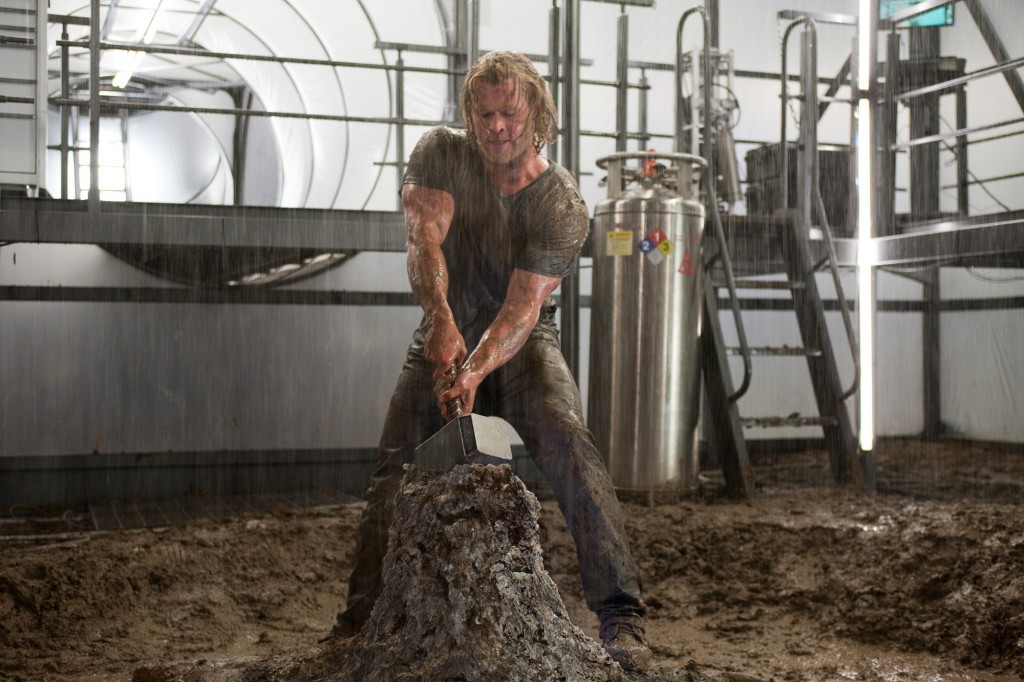
UNIDENTIFIED SPEAKER: [OVERLAPPING] So dreamy! [LAUGHTER]
KENNETH BRANAGH: As Louis D’Esposito, co-president of Marvel, said when we looked at it a few weeks ago when we were finishing it off he said, “My god, he looks good in Three-D!” [LAUGHTER]
INTERVIEWER: Kenneth, over here, was there any effort to be eco-friendly at all on the set to reduce, reuse, recycle any materials or waste and reduce energy waste, anything like that? I know it’s a big action movie but–
KENNETH BRANAGH: Well, we tried–
INTERVIEWER: –was there a concern that way?
KENNETH BRANAGH: –tried where we could to be perfectly honest, led by Natalie Portman who resisted as we are not doing this morning, the use of plastic bottles.
INTERVIEWER: [SOUNDS LIKE] And what was she–
KENNETH BRANAGH: And so she was an influence, it was very–in the action sequences in terms of smoke, energy we used, no it was a factor. I think it is woven into what we do you’re right. So it is an action movie and you’re gonna spill some water every now and again, but I think, you know, we attended to it and we did the best we could.
INTERVIEWER: Ken, could you talk about discovering Thor in the comics as a young person or a teen and how–what was it about that that you thought was, “He’s a cool guy.”?
KENNETH BRANAGH: Well, for me it was this sort of the primitive quality. I liked his wild quality. I like the Viking at the center of it, that’s what I saw when I saw those images on a comic book. That he was volatile, I thought that would be dangerous in telling a movie, that he’s not too smooth. He’s not too slick and one of the things that we were trying to achieve in the telling of the story was that it could feel, you know, in the moment. That there could be some kind of, you know, danger–genuine danger.
Well, what do the boys–what was, how was your [SOUNDS LIKE] thought? How was your Thor,
was your first Thor sort of–you know, why were you drawn to that character if you were?
UNIDENTIFIED SPEAKER: [SOUNDS LIKE] Thor experience?
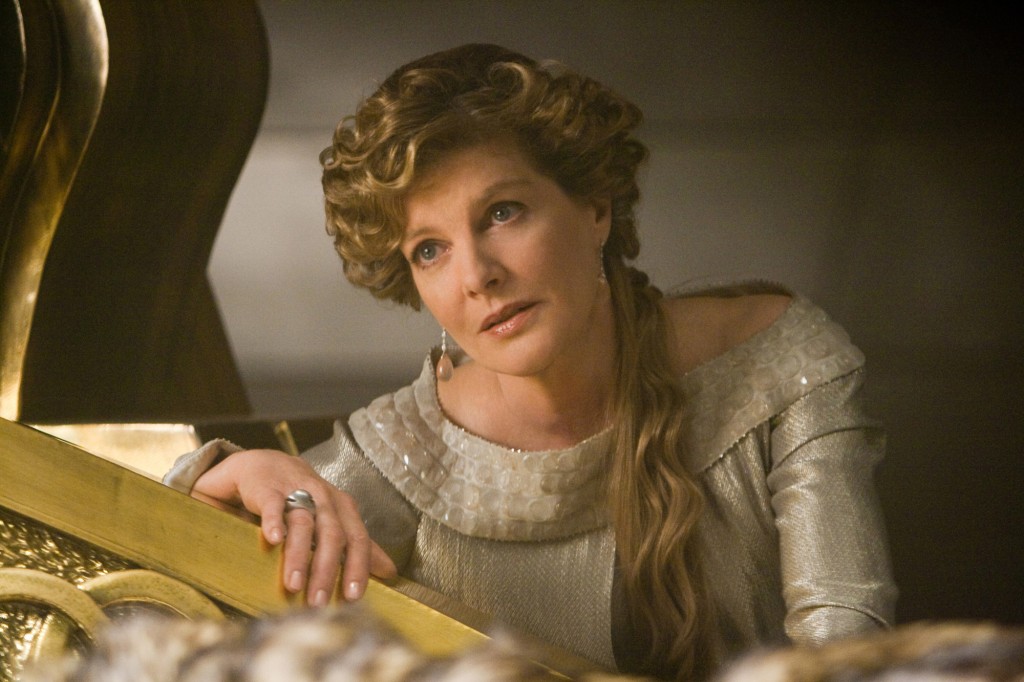
KENNETH BRANAGH: Yeah.
UNIDENTIFIED SPEAKER: You know, I was just a big Marvel fan since I was a kid and I just was also drawn to mythology and that was the perfect blend of both. I also loved seeing him in the Avengers, ‘cause he was–it was this strange group of eclectic heroes that doesn’t seem like they belong together and ultimately they did.
KENNETH BRANAGH: Yeah.
UNIDENTIFIED SPEAKER: Somehow it worked.
KENNETH BRANAGH: Yeah.
UNIDENTIFIED SPEAKER: And so–
UNIDENTIFIED SPEAKER: And I think, you know, the issues that were my favorites were always the–you know, the kind of putting Thor and Loki together and that goes all the way back to–all the way back to Norse mythology. And there’s just something very primal and awesome about putting a strong man and a clever man together and at odds with each other.
ASHLEY MILLER: Yeah, and for me, you know, I was a gigantic fan of Thor as a lad. I’ve got a complete run of everything that well Simonson breathed on with that character. And what really excited me was the possibility of doing the story where a frog finds the hammer and becomes Thor, but Kevin and Ken said no, “There that’s not happening.” So we kept it a big guy who looks good in Three-D.
KENNETH BRANAGH: What about you Kevin, what did you feel about Thor?
KEVIN FEIGE: I like Thor. [LAUGHTER]
KENNETH BRANAGH: Right answer.
KEVIN FEIGE: Well, you know, yes I grew up with the character as I did with all the Marvel characters, but frankly I always wanted to do–I was particularly excited about it coming off of being a part of the Spidey films and the X-Men films and the Hulk films and more recently the Iron Man films, but wanting to expand the notion of a Marvel movie. I like the idea of going to outer space, to going to more of a sci-fi sandbox, which is why frankly we didn’t shy away from big giant gleaming cities in outer space and other planets. Things that–you know, the travel, the [SOUNDS LIKE] by frost travel, which was always a part of the mythology in every comic book, but the way Ken envisioned it in this film has really–you know, this the place with Heimdall with Idris Elba standing in the center of it. It’s just much more of a sci-fi edge at which I always wanted to be a part of and very proud that we’ve pulled it off in a way that all audiences, whether they have read comics or haven’t read comics or like science fiction or don’t like science fiction can respond to and relate to.
INTERVIEWER: This is probably for Kevin and Ken, aside from the Avengers will we be seeing Thor return in maybe some sequels; do you have a trilogy planned and [NOISE IN BACKGROUND] Ken–
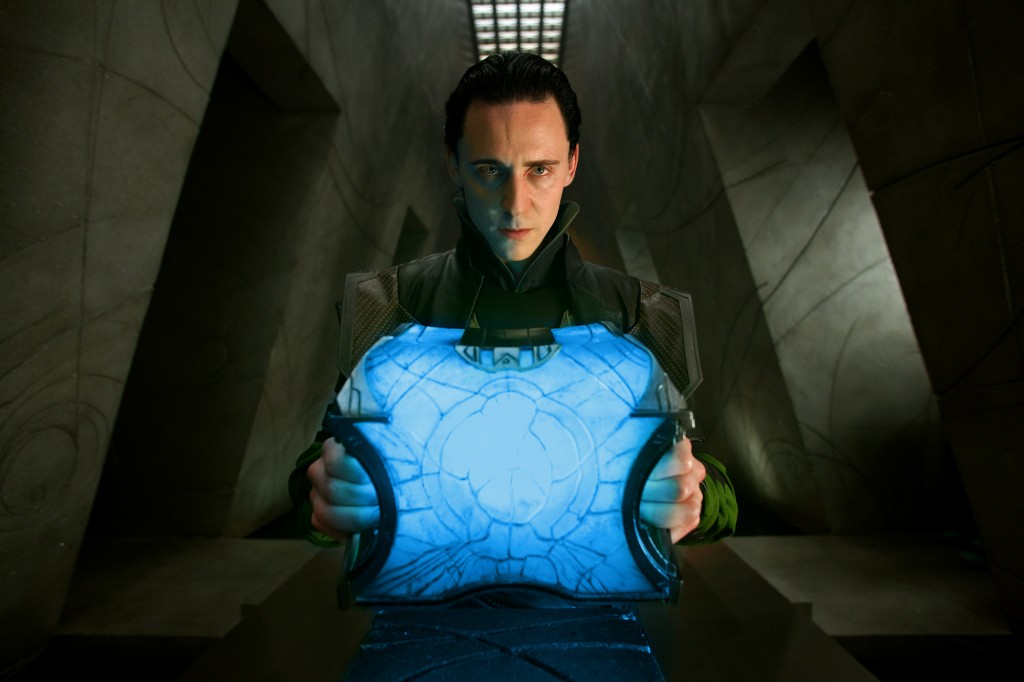
KENNETH BRANAGH: [SOUNDS LIKE] There, sorry didn’t you see you.
INTERVIEWER: –Ken will you be returning to direct as well?
KEVIN FEIGE: Well, you know, listen when we embark on this we always–as we’ve already discussed today we’ve got 600 plus issues, we’ve got a thousand years of mythology, we have other stories we’d like to tell. The audience will tell us whether they want to see those other stories, but we have to be prepared for that if that–if we should get the call. So Don Payne is working on story ideas for a Part Two, we’ve got various options with Ken to discuss coming, but right now the focus is on the first one but Don is slowly but surely thinking about where to take the character next should we be so lucky.
KENNETH BRANAGH: Also, we’re also–Kevin and I share, from my point of view, a sort of deep Irish Celtic superstition of taking anything for granted, so–
KEVIN FEIGE: [CHUCKLES] Yes.
KENNETH BRANAGH: –we and the Marvel world is a world of non-assumption. When I first just started in the film business–but please forgive the language I’m about to use–a producer said to me, “Young man, assumption is the mother of all fuckups.” [LAUGHTER] So I–we are assuming
nothing, we are offering the film out to the world and we shall listen, is what will happen.
INTERVIEWER: Kenneth, can you talk a little bit about a–I would imagine the casting of Loki character was tough, because that character has gotta be so passive-aggressive and could you just talk about casting Tom for that?
KENNETH BRANAGH: It was–and I’m sure the boys might have something interesting to say about the character, but certainly from the performance point of view we needed somebody who was complex and could remain intelligent. And for me I think there was a constant conversation between us all about can we, should we, is it a good thing to keep the question mark over Loki’s character throughout? Is he bad, does he have a plan, does he love his brother, does he hate his brother, hate his father, is this happening before our very eyes, how does he truly react to the secrets and lies that emerge in the course of the story? And so you needed someone who, you know, could be adept at putting on all those masks and make it seem seamless, so that you were in the scene with the other character who–for instance, when he visits Thor on Earth, you know, and really does something quite appalling in terms of what he passes on. And it’s a beautiful scene, I think, acted very well by the pair of them.
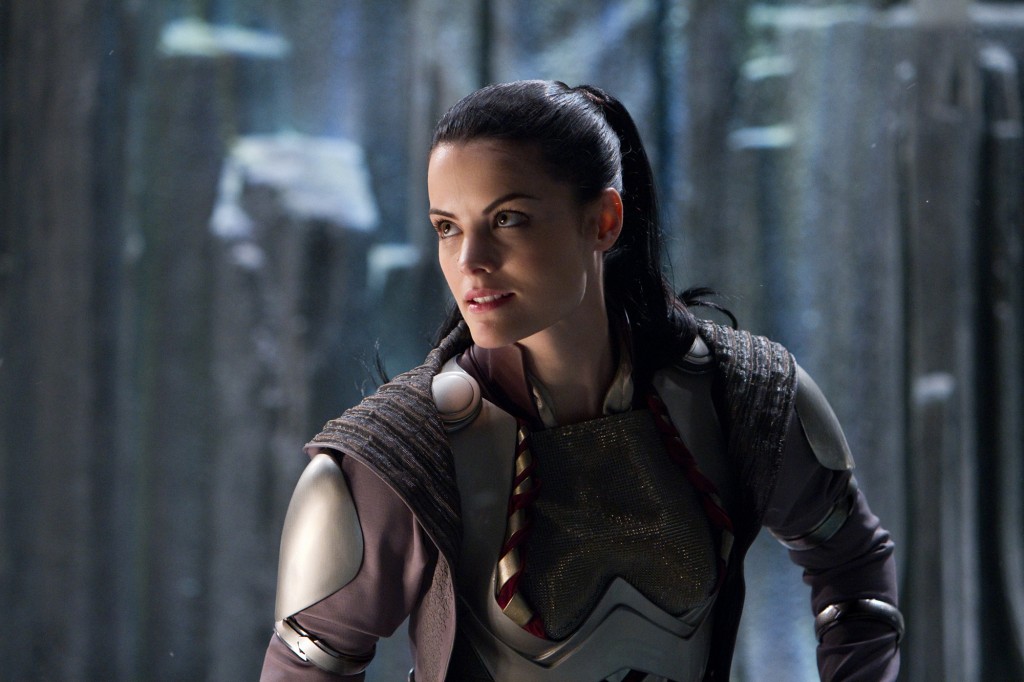
I think that sort of level of shocking skill in a sort of actor in life was what we were after from the performance. Tom I’d worked with in England in the UK on television and theater and knew that he was energized, bright, adroit quick-thinking. That’s what we wanted from the performance, but in terms of the character I don’t know if [SOUNDS LIKE] that makes sense.
UNIDENTIFIED SPEAKER: [OVERLAPPING] Yeah, I think–well–
KENNETH BRANAGH: Yeah, go on.
UNIDENTIFIED SPEAKER: I think all three of us were trying to find the right balance between how much does he know, how bad is he, at what point what did he really do to get to this–to get to the character we all know and hate and love at the end. And–
UNIDENTIFIED SPEAKER: [OVERLAPPING] Well, and yeah, no absolutely.
UNIDENTIFIED SPEAKER: And yeah, I think the great thing about Loki is that he is this–he’s always smart, he’s always crafting these intricate things that almost always work, but something–he’s gone one step too far all the time. And I think that scene that Ken references where he goes one step too far, he’s bringing Thor down to the lowest he’s ever been and that’s actually the thing that triggers Thor’s redemption at the end. And that seems to be–reflect the comics, I think quite a bit.
ZACK STENTZ: So yeah, so what I love about Loki too as a character is just that if you asked him, he would say that he is the hero of that movie and it’s interesting putting yourself in the mindset of someone who from his perspective is completely right in what he’s doing. And that’s kind of the gold standard of a villain, a great villain in some ways.
UNIDENTIED SPEAKER: And he’s got a point. At the beginning Thor isn’t ready, Thor is an arrogant jerk.
ZACK STENZT: [OVERLAPPING] Yeah.
UNIDENTIFIED SPEAKER: At the beginning he’s not ready to run the kingdom and he knows that and he took steps to prevent that from happening, and so…
UNIDENTIED SPEAKER: And frankly I think, you know, the thing that is really fascinating about this film and how it works out and the role that Loki plays is in a way Loki does by the end of the movie, everything that Thor wanted to do. You know, and that’s fascinating that really at the heart of that character like Zack said he thinks he’s the hero of the movie. He does everything in his own mind out of love, or at least that’s what he tells himself and a need for that. And it’s hard when you are writing a character like that not to be sympathetic to him in some way. And, you know, obviously Tom is amazing and he just–he takes all of things that we’re talking about very intellectually and he just personifies it and he just boils it down and he just lets it live and he’s just–he’s astounding. He’s a great movie villain.
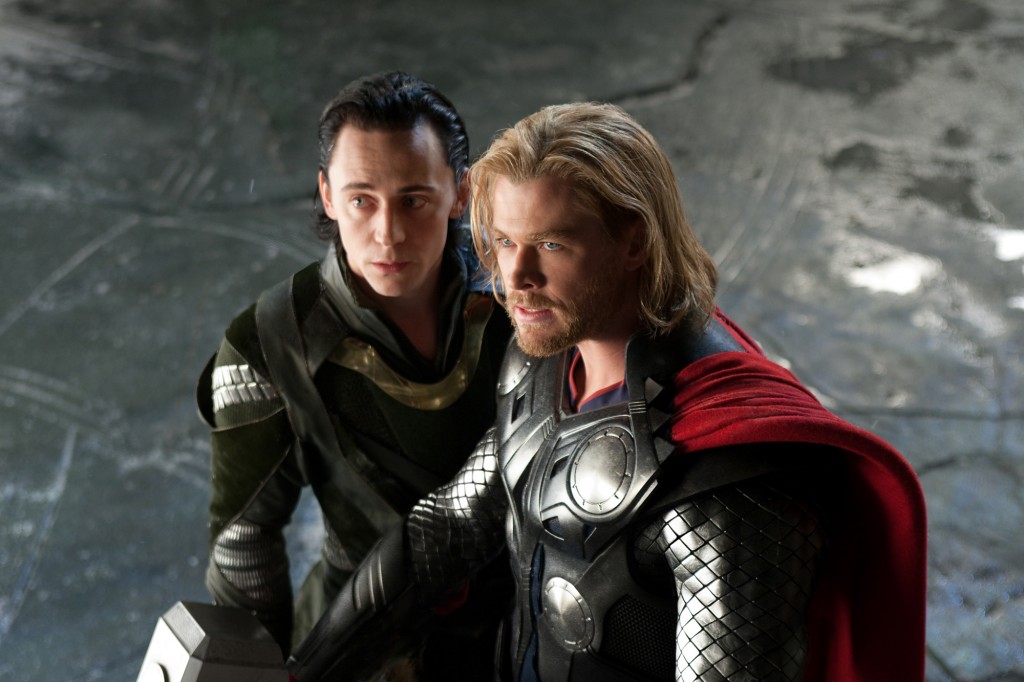
UNIDENTIFIED SPEAKER: I think everyone from Day One did their best to keep this from being a mustache-twirling cardboard cutout villain from Tom down to everyone.
KEVIN FEIGE: And the movie very much is an origin of Loki almost as much as it is an origin of Thor and that’s something we had to ride that balance. You know, there were drafts where Thor took over too much or there were certainly drafts where Loki became too prominent, and I think we found a nice balance that is clearly the origin of both of those characters. And Tom is a great actor, there’s no doubt about it, but make no mistake–Tom like Loki, wants to be Thor. [LAUGHTER] Wanted to be Thor, he was up for it, he actually auditioned for Thor right?
KENNETH BRANAGH: He did, yes.
KEVIN FEIGE: For Thor, and he’s talked about that and he gained all sorts of weight and he did his audition and we went, “You’re Loki.” [LAUGHTER AND COMMENTS] And there’s a piece of B-Roll, it might be online.
KENNETH BRANAGH: [INDISCERNIBLE]
KEVIN FEIGE: It might be online now, it’ll definitely be on the DVD, where Tom and Chris are in our big ceremony, Asgardian ceremony set in their full costumes and Tom and Chris is holding his hammer as he did throughout the whole movie and Tom just comes by–this is behind the scenes footage–comes by and, “Let me hold that, let me hold that for a minute.” And you see Tom holding it and dressed as Loki holding it swinging the hammer around and Chris like, “Hey, gimme that back.” [LAUGHTER] It was such a–
UNIDENTIFIED SPEAKER: [OVERLAPPING] Obviously he was worried.
KEVIN FEIGE: [LAUGHS] He was worried–there was such a glee on his face too as he’s holding it up.
UNIDENTIFIED SPEAKER: [SOUNDS LIKE] It’s a great slip.
KEVIN FEIGE: It’s very telling.
INTERVIEWER: For the writers and for Mr. Feige–asking for Ken here at a press conference is a fairly hollow exercise, but Mr. Feige you’re thinking of the next eight films Marvel wants to make while you gentlemen are trying to make one very good film. Did you ever butt heads between your desire to make one film and your desire to empire build? [LAUGHTER]
KEVIN FEIGE: Do you guys want to start, just go ahead.
UNIDENTIFIED SPEAKER: Yeah, I mean look here’s the thing and we’ve worked for a lot of different people in this town, a lot of studios and a lot of different kinds of projects, and I’ve gotta say here’s the thing that I love most about working with Marvel and Kevin really personifies this. Is that usually when you go into a room and you sit down with somebody and you’re talking to them about their franchise character or the book they want to adapt or their comic book, whatever that is you have to have a conversation about why that character or that franchise is cool. Marvel already knows that it’s cool; you don’t have to justify Thor to Marvel. You know, you don’t have to explain to them why the character works and why people are passionate about it, all you have to do is agree on what’s the best story to tell. And really again, one of the wonderful things is that, you know, I can’t speak to Empire but I can tell you that Marvel, you know, as a whole was very focused on making this the best movie it could possibly be, you know? And that was a great experience to have and a great environment to work in.
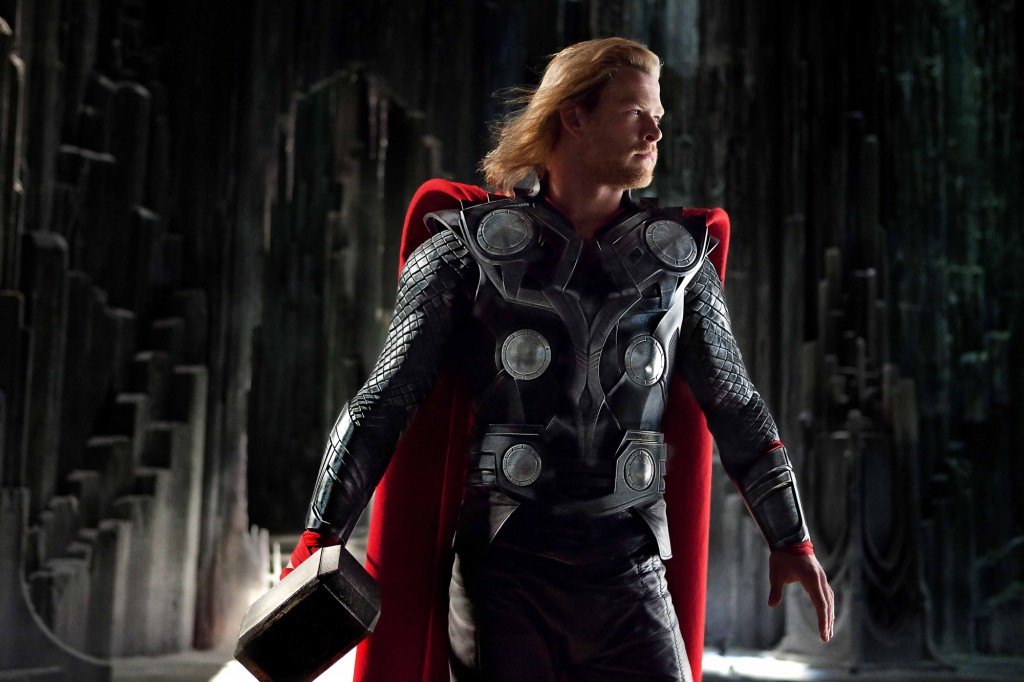
KEVIN FEIGE: And we were all fans. We love the Easter eggs as long as they don’t take over the film, you know? It’s gotta be its own Thor story, but everyone was on board with that from the beginning. That Thor is its own stand-alone tale and it’s part of the Marvel cinematic universe and Easter eggs are fun, but it’s gotta stand on its own and I think everyone had the same viewpoint about that.
UNIDENTIFIED SPEAKER: Absolutely.
INTERVIEWER: This question’s more directed maybe to Zack and Ashley, but the inclusion more–or the more integration of S.H.I.E.L.D. was really apparent in this film more so than, you know, the Iron Man films. Can you talk about maybe folding that in more with this particular script as well as making S.H.I.E.L.D almost look over their heads? Like they’re, “We’re out of our element here, ‘cause we don’t know what to do.”
UNIDENTIFIED SPEAKER: I mean you need–I mean, you all have seen the film. What was great about S.H.I.E.L.D is that they’re a great Thor–is that Thor needs a force of opposition through the entire film and obviously when he’s in Asgard or when he’s in Jotunheim there are, you know, frost giants and monsters and his brother and things like that, but once he gets down to Earth he needs obstacles. He needs obstacles in the way of, you know, getting back his hammer and S.H.I.E.L.D was a way–you know, making S.H.I.E.L.D prominent in that way was just a great way to give something that could push back against Thor especially when he didn’t
have his powers.
UNIDENTIFIED SPEAKER: And especially when you’ve got Clark Gregg who is just awesome and just the perfect foil for that.
UNIDENTIFIED SPEAKER: Now, I love Clark Gregg and I just think he’s so–ever since Iron Man One something about his smirk and you know there’s so much more going on underneath the surface, there’s something menacing about that smirk and S.H.I.E.L.D was this heroic organization in the Iron Man films. And it’s still scary how easily you can transition that to a shadowy government organization for Thor.
UNIDENTIFIED SPEAKER: Uh-huh, absolutely.
INTERVIEWER: Okay, and that is all the time that we have for today ladies and gentlemen, thank you very much.
UNIDENTIFIED SPEAKER: Thanks everybody, thank you. [APPLAUSE]
KENNETH BRANAGH: Thanks very much.
[END AUDIO]